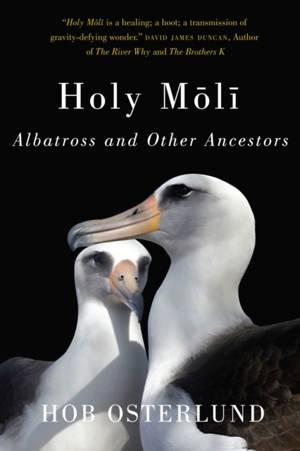
- Afhalen na 1 uur in een winkel met voorraad
- Gratis thuislevering in België vanaf € 30
- Ruim aanbod met 7 miljoen producten
- Afhalen na 1 uur in een winkel met voorraad
- Gratis thuislevering in België vanaf € 30
- Ruim aanbod met 7 miljoen producten
Zoeken
Omschrijving
Hob Osterlund moved to Hawai'i after being visited in a dream by an ancestor, Martha Beckwith, author of the monumental classic, Hawaiian Mythology. It was there, on the island of Kaua'i, where she happened upon a few courting albatross and felt an inexplicable attraction to the birds--an attraction too powerful to be explained by their beguiling airbrushed eye shadows, enormous wingspans, and rollicking dances. In Hawaiian mythology, ancestors may occupy the physical forms of animals known as 'aumakua. Laysan albatross--known as moli--are among them. Smitten with these charismatic creatures, Osterlund set out to learn everything she could about moli. She eventually came to embrace them as her 'aumakua--not as dusty old myths on a museum bookshelf, but as breathing, breeding, boisterous realities. Albatross sport many superlative qualities. They live long--sometimes longer than sixty years--and spend the majority of their time airborne, gliding across vast oceanic expanses. They are model mates and devoted parents, and are among the only animals known to take long-term same-sex partners. In nesting season, they rack up inconceivable mileage just to find supper for chicks waiting on the islands of the Hawaiian archipelago. It is from the island of Kaua'i that Holy Moli takes flight. Osterlund relates a true tale of courage, celebration and grief--of patience, affection and resilience. This is the story of how albatross guided the author on her own long journey, retracing distances and decades, back to the origin of a binding bargain she struck when she was ten years old, shortly after her mother's death. Holy Moli is a natural history of the albatross, a moving memoir of grief, and a soaring tribute to ancestors. Within its pages are lyrics of wonder--for freedom, for beauty, and for the far-flung feathered creatures known to us as albatross.
Specificaties
Betrokkenen
- Auteur(s):
- Uitgeverij:
Inhoud
- Aantal bladzijden:
- 208
- Taal:
- Engels
Eigenschappen
- Productcode (EAN):
- 9780870718489
- Verschijningsdatum:
- 5/05/2016
- Uitvoering:
- Paperback
- Formaat:
- Trade paperback (VS)
- Afmetingen:
- 152 mm x 226 mm
- Gewicht:
- 272 g

Alleen bij Standaard Boekhandel
+ 57 punten op je klantenkaart van Standaard Boekhandel
Beoordelingen
We publiceren alleen reviews die voldoen aan de voorwaarden voor reviews. Bekijk onze voorwaarden voor reviews.













